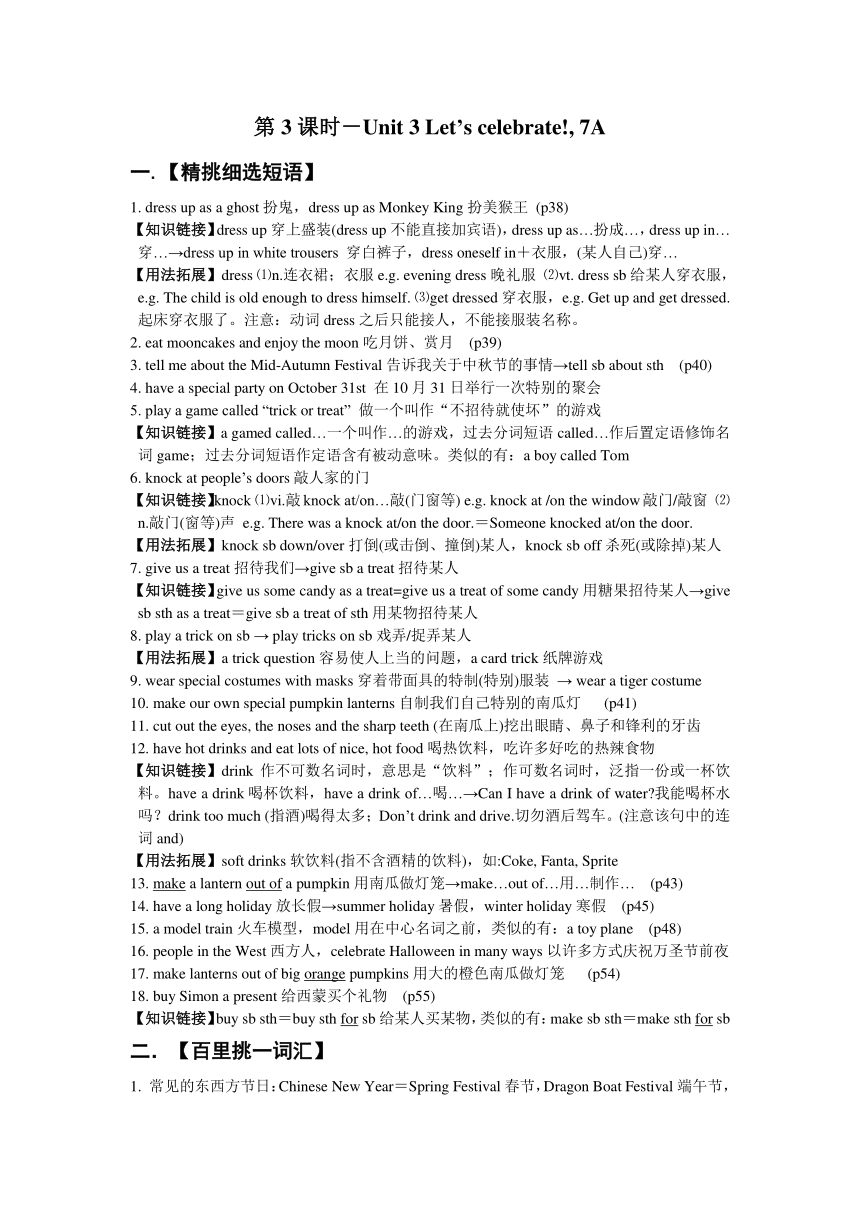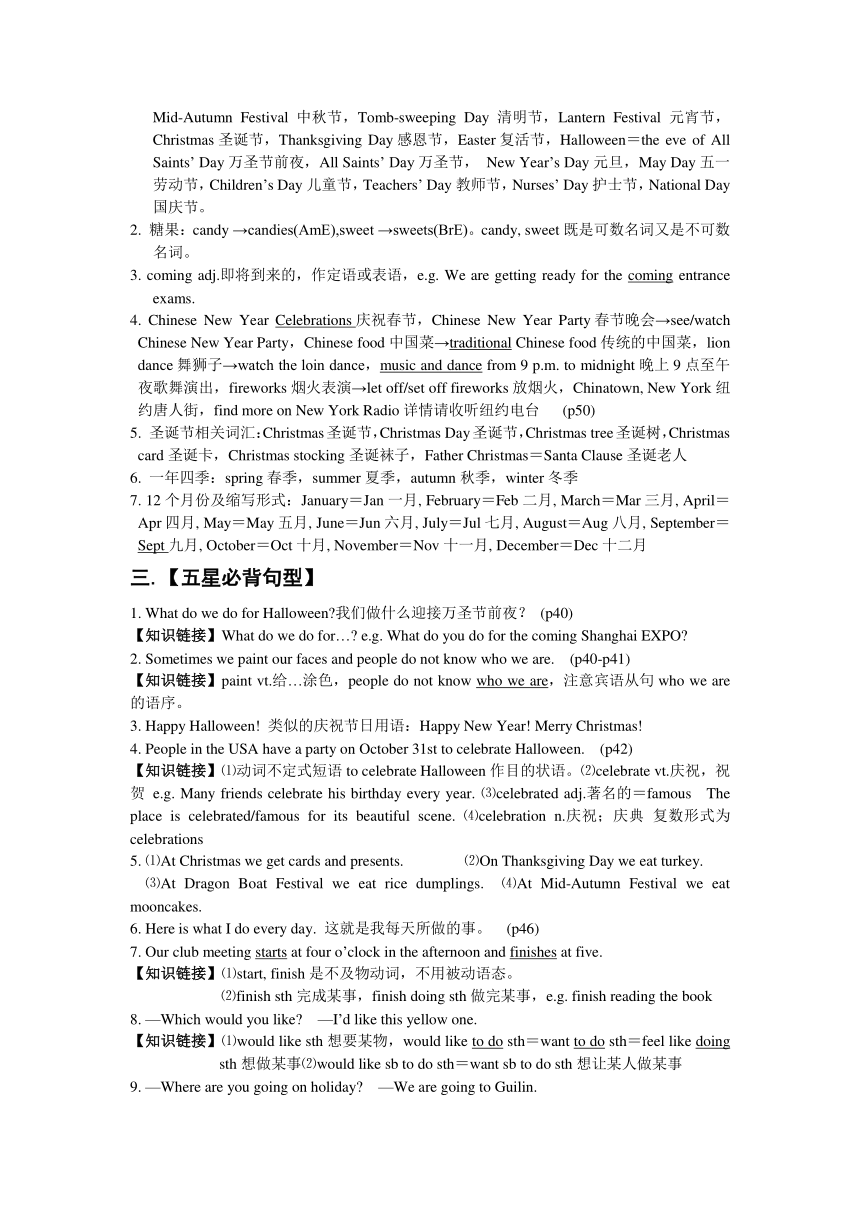2012年江苏省中考英语一轮复习7A Unit3讲解
文档属性
| 名称 | 2012年江苏省中考英语一轮复习7A Unit3讲解 |  | |
| 格式 | zip | ||
| 文件大小 | 18.5KB | ||
| 资源类型 | 教案 | ||
| 版本资源 | 通用版 | ||
| 科目 | 英语 | ||
| 更新时间 | 2012-01-10 16:10:18 | ||
图片预览


文档简介
第3课时-Unit 3 Let’s celebrate!, 7A
一.【精挑细选短语】
1. dress up as a ghost扮鬼,dress up as Monkey King扮美猴王 (p38)
【知识链接】dress up穿上盛装(dress up不能直接加宾语),dress up as…扮成…,dress up in…穿…→dress up in white trousers 穿白裤子,dress oneself in+衣服,(某人自己)穿…
【用法拓展】dress ⑴n.连衣裙;衣服e.g. evening dress晚礼服 ⑵vt. dress sb给某人穿衣服,e.g. The child is old enough to dress himself. ⑶get dressed穿衣服,e.g. Get up and get dressed.起床穿衣服了。注意:动词dress之后只能接人,不能接服装名称。
2. eat mooncakes and enjoy the moon吃月饼、赏月 (p39)
3. tell me about the Mid-Autumn Festival告诉我关于中秋节的事情→tell sb about sth (p40)
4. have a special party on October 31st 在10月31日举行一次特别的聚会
5. play a game called “trick or treat” 做一个叫作“不招待就使坏”的游戏
【知识链接】a gamed called…一个叫作…的游戏,过去分词短语called…作后置定语修饰名词game;过去分词短语作定语含有被动意味。类似的有:a boy called Tom
6. knock at people’s doors敲人家的门
【知识链接】knock ⑴vi.敲knock at/on…敲(门窗等) e.g. knock at /on the window敲门/敲窗 ⑵ n.敲门(窗等)声 e.g. There was a knock at/on the door.=Someone knocked at/on the door.
【用法拓展】knock sb down/over打倒(或击倒、撞倒)某人,knock sb off杀死(或除掉)某人
7. give us a treat招待我们→give sb a treat招待某人
【知识链接】give us some candy as a treat=give us a treat of some candy用糖果招待某人→give sb sth as a treat=give sb a treat of sth用某物招待某人
8. play a trick on sb → play tricks on sb戏弄/捉弄某人
【用法拓展】a trick question容易使人上当的问题,a card trick纸牌游戏
9. wear special costumes with masks穿着带面具的特制(特别)服装 → wear a tiger costume
10. make our own special pumpkin lanterns自制我们自己特别的南瓜灯 (p41)
11. cut out the eyes, the noses and the sharp teeth (在南瓜上)挖出眼睛、鼻子和锋利的牙齿
12. have hot drinks and eat lots of nice, hot food喝热饮料,吃许多好吃的热辣食物
【知识链接】drink作不可数名词时,意思是“饮料”;作可数名词时,泛指一份或一杯饮料。have a drink喝杯饮料,have a drink of…喝…→Can I have a drink of water 我能喝杯水吗?drink too much (指酒)喝得太多;Don’t drink and drive.切勿酒后驾车。(注意该句中的连词and)
【用法拓展】soft drinks软饮料(指不含酒精的饮料),如:Coke, Fanta, Sprite
13. make a lantern out of a pumpkin用南瓜做灯笼→make…out of…用…制作… (p43)
14. have a long holiday放长假→summer holiday暑假,winter holiday寒假 (p45)
15. a model train火车模型,model用在中心名词之前,类似的有:a toy plane (p48)
16. people in the West西方人,celebrate Halloween in many ways以许多方式庆祝万圣节前夜
17. make lanterns out of big orange pumpkins用大的橙色南瓜做灯笼 (p54)
18. buy Simon a present给西蒙买个礼物 (p55)
【知识链接】buy sb sth=buy sth for sb给某人买某物,类似的有:make sb sth=make sth for sb
二.【百里挑一词汇】
1. 常见的东西方节日:Chinese New Year=Spring Festival春节,Dragon Boat Festival端午节,Mid-Autumn Festival中秋节,Tomb-sweeping Day清明节,Lantern Festival元宵节,Christmas圣诞节,Thanksgiving Day感恩节,Easter复活节,Halloween=the eve of All Saints’ Day万圣节前夜,All Saints’ Day万圣节, New Year’s Day元旦,May Day五一劳动节,Children’s Day儿童节,Teachers’ Day教师节,Nurses’ Day护士节,National Day国庆节。
2. 糖果:candy →candies(AmE),sweet →sweets(BrE)。candy, sweet既是可数名词又是不可数名词。
3. coming adj.即将到来的,作定语或表语,e.g. We are getting ready for the coming entrance exams.
4. Chinese New Year Celebrations庆祝春节,Chinese New Year Party春节晚会→see/watch Chinese New Year Party,Chinese food中国菜→traditional Chinese food传统的中国菜,lion dance舞狮子→watch the loin dance,music and dance from 9 p.m. to midnight晚上9点至午夜歌舞演出,fireworks烟火表演→let off/set off fireworks放烟火,Chinatown, New York纽约唐人街,find more on New York Radio详情请收听纽约电台 (p50)
5. 圣诞节相关词汇:Christmas圣诞节,Christmas Day圣诞节,Christmas tree圣诞树,Christmas card圣诞卡,Christmas stocking圣诞袜子,Father Christmas=Santa Clause圣诞老人
6. 一年四季:spring春季,summer夏季,autumn秋季,winter冬季
7. 12个月份及缩写形式:January=Jan一月, February=Feb二月, March=Mar三月, April=Apr四月, May=May五月, June=Jun六月, July=Jul七月, August=Aug八月, September=Sept九月, October=Oct十月, November=Nov十一月, December=Dec十二月
三.【五星必背句型】
1. What do we do for Halloween 我们做什么迎接万圣节前夜? (p40)
【知识链接】What do we do for… e.g. What do you do for the coming Shanghai EXPO
2. Sometimes we paint our faces and people do not know who we are. (p40-p41)
【知识链接】paint vt.给…涂色,people do not know who we are,注意宾语从句who we are的语序。
3. Happy Halloween! 类似的庆祝节日用语:Happy New Year! Merry Christmas!
4. People in the USA have a party on October 31st to celebrate Halloween. (p42)
【知识链接】⑴动词不定式短语to celebrate Halloween作目的状语。⑵celebrate vt.庆祝,祝贺 e.g. Many friends celebrate his birthday every year. ⑶celebrated adj.著名的=famous The place is celebrated/famous for its beautiful scene. ⑷celebration n.庆祝;庆典 复数形式为celebrations
5. ⑴At Christmas we get cards and presents. ⑵On Thanksgiving Day we eat turkey.
⑶At Dragon Boat Festival we eat rice dumplings. ⑷At Mid-Autumn Festival we eat mooncakes.
6. Here is what I do every day. 这就是我每天所做的事。 (p46)
7. Our club meeting starts at four o’clock in the afternoon and finishes at five.
【知识链接】⑴start, finish是不及物动词,不用被动语态。
⑵finish sth完成某事,finish doing sth做完某事,e.g. finish reading the book
8. —Which would you like —I’d like this yellow one.
【知识链接】⑴would like sth想要某物,would like to do sth=want to do sth=feel like doing sth想做某事⑵would like sb to do sth=want sb to do sth想让某人做某事
9. —Where are you going on holiday —We are going to Guilin.
【知识链接】go to…on holiday去某地度假,e.g. They went to Qingdao on holiday last summer.
10. We get some red packets and there’s always some money in them. (p49)
【知识链接】get red packets收红包,get presents收到礼物→give presents赠送礼物
11. It is my first time to see it and I am very excited. (p51)
【知识链接】It is one’s first/last time to do sth.某人第一次/最后一次做某事。
12. Which is your favourite day in the year 你最喜欢一年中的哪一天
【知识链接】which常用于对较小范围的提问,该句不能用what代替which。
13. —When’s your birthday —It’s on 3rd October. 注意:when’s=when is,when are不缩写。
14. They put candles in them so the light shines through the eyes, the nose and the teeth. (p54)
【知识链接】put…in…把…放进…,shine through…透过…照进来(不能用across代替through) e.g.
The sun shines through the window.太阳透过窗户照进来。
四.【中考无敌语法】at, on, in表示时间、疑问词、some, any的用法
㈠表示时间的介词at, on, in
⒈ at用在三餐、时刻、年龄、传统节日前。e.g.
at supper, at lunchtime, at 8:15a.m., at 6=at the age of 6, at Christmas, at Halloween, at Dragon Boat Festival, at Mid-Autumn Festival, at Chinese New Year
⒉ in指每天上、下、晚和月、季、年。e.g.
in the morning/afternoon/evening, in May, in winter, in 2008, 注意以下三个短语中的介词和冠词:in the evening在晚上(指天黑至睡觉前),at night在晚上(指天黑到夜里12点,即上半夜), in the night在夜晚(指天黑到天亮,即一整夜)。
⒊ on指具体某一天:星期、月日“带(day)”节日;还指当天上、下、晚。
此处的节日指非传统节日或传统节日的当天。注意区别:at Christmas, on Christmas Day e.g
on a cold evening, on that day, on Monday, on January 1st,on the morning of February 6th, on Friday afternoon, on Christmas Day=on December 25th, on Teachers’ Day, on May Day, on Children’s Day, on Women’s Day, on Mother’s Day, on Father’s Day, on National Day
㈡疑问词what, which, who, whose, when, where, why, how
疑问词 提问内容 疑问词 提问内容
What 动作、物体、职业 When 上午、下午、晚上,某天、月、季、年等
Which 人或物 Where 地点
Who 人 Why 原因
Whose 物主代词、名词所有格 How 方式
What time 时刻 How manyHow much 数量
㈢some, any
⒈ 当some和any用来修饰可数名词单数时,some表示某一个,any表示任何一个。e.g.
① He is working at some place in the north.
② We must find an excuse; any excuse will do.
⒉ 一般说来,some多用于肯定句,any多用于否定句、疑问句或条件句。e.g.
① Don’t pick any of these flowers.
② Have you read any of her books
③ Ask me if you have any question.
⒊ some也可用在疑问句中,表示盼望得到肯定的回答或表示请求、建议、招待客人等。e.g.
① Would you like some coffee
② Could you ask her to bring some water for me
⒋ any还可用作副词,常与比较级连用,表示程度,意为“稍微”。e.g.
① Are you feeling any better
② She doesn’t live here any longer.
③ The baby didn’t cry any more.
用some或any填空
① Are there Halloween parties in Beijing
② Do you play special games at Chinese New Year
③ I’m not a little hungry. Could you give me food
一.【精挑细选短语】
1. dress up as a ghost扮鬼,dress up as Monkey King扮美猴王 (p38)
【知识链接】dress up穿上盛装(dress up不能直接加宾语),dress up as…扮成…,dress up in…穿…→dress up in white trousers 穿白裤子,dress oneself in+衣服,(某人自己)穿…
【用法拓展】dress ⑴n.连衣裙;衣服e.g. evening dress晚礼服 ⑵vt. dress sb给某人穿衣服,e.g. The child is old enough to dress himself. ⑶get dressed穿衣服,e.g. Get up and get dressed.起床穿衣服了。注意:动词dress之后只能接人,不能接服装名称。
2. eat mooncakes and enjoy the moon吃月饼、赏月 (p39)
3. tell me about the Mid-Autumn Festival告诉我关于中秋节的事情→tell sb about sth (p40)
4. have a special party on October 31st 在10月31日举行一次特别的聚会
5. play a game called “trick or treat” 做一个叫作“不招待就使坏”的游戏
【知识链接】a gamed called…一个叫作…的游戏,过去分词短语called…作后置定语修饰名词game;过去分词短语作定语含有被动意味。类似的有:a boy called Tom
6. knock at people’s doors敲人家的门
【知识链接】knock ⑴vi.敲knock at/on…敲(门窗等) e.g. knock at /on the window敲门/敲窗 ⑵ n.敲门(窗等)声 e.g. There was a knock at/on the door.=Someone knocked at/on the door.
【用法拓展】knock sb down/over打倒(或击倒、撞倒)某人,knock sb off杀死(或除掉)某人
7. give us a treat招待我们→give sb a treat招待某人
【知识链接】give us some candy as a treat=give us a treat of some candy用糖果招待某人→give sb sth as a treat=give sb a treat of sth用某物招待某人
8. play a trick on sb → play tricks on sb戏弄/捉弄某人
【用法拓展】a trick question容易使人上当的问题,a card trick纸牌游戏
9. wear special costumes with masks穿着带面具的特制(特别)服装 → wear a tiger costume
10. make our own special pumpkin lanterns自制我们自己特别的南瓜灯 (p41)
11. cut out the eyes, the noses and the sharp teeth (在南瓜上)挖出眼睛、鼻子和锋利的牙齿
12. have hot drinks and eat lots of nice, hot food喝热饮料,吃许多好吃的热辣食物
【知识链接】drink作不可数名词时,意思是“饮料”;作可数名词时,泛指一份或一杯饮料。have a drink喝杯饮料,have a drink of…喝…→Can I have a drink of water 我能喝杯水吗?drink too much (指酒)喝得太多;Don’t drink and drive.切勿酒后驾车。(注意该句中的连词and)
【用法拓展】soft drinks软饮料(指不含酒精的饮料),如:Coke, Fanta, Sprite
13. make a lantern out of a pumpkin用南瓜做灯笼→make…out of…用…制作… (p43)
14. have a long holiday放长假→summer holiday暑假,winter holiday寒假 (p45)
15. a model train火车模型,model用在中心名词之前,类似的有:a toy plane (p48)
16. people in the West西方人,celebrate Halloween in many ways以许多方式庆祝万圣节前夜
17. make lanterns out of big orange pumpkins用大的橙色南瓜做灯笼 (p54)
18. buy Simon a present给西蒙买个礼物 (p55)
【知识链接】buy sb sth=buy sth for sb给某人买某物,类似的有:make sb sth=make sth for sb
二.【百里挑一词汇】
1. 常见的东西方节日:Chinese New Year=Spring Festival春节,Dragon Boat Festival端午节,Mid-Autumn Festival中秋节,Tomb-sweeping Day清明节,Lantern Festival元宵节,Christmas圣诞节,Thanksgiving Day感恩节,Easter复活节,Halloween=the eve of All Saints’ Day万圣节前夜,All Saints’ Day万圣节, New Year’s Day元旦,May Day五一劳动节,Children’s Day儿童节,Teachers’ Day教师节,Nurses’ Day护士节,National Day国庆节。
2. 糖果:candy →candies(AmE),sweet →sweets(BrE)。candy, sweet既是可数名词又是不可数名词。
3. coming adj.即将到来的,作定语或表语,e.g. We are getting ready for the coming entrance exams.
4. Chinese New Year Celebrations庆祝春节,Chinese New Year Party春节晚会→see/watch Chinese New Year Party,Chinese food中国菜→traditional Chinese food传统的中国菜,lion dance舞狮子→watch the loin dance,music and dance from 9 p.m. to midnight晚上9点至午夜歌舞演出,fireworks烟火表演→let off/set off fireworks放烟火,Chinatown, New York纽约唐人街,find more on New York Radio详情请收听纽约电台 (p50)
5. 圣诞节相关词汇:Christmas圣诞节,Christmas Day圣诞节,Christmas tree圣诞树,Christmas card圣诞卡,Christmas stocking圣诞袜子,Father Christmas=Santa Clause圣诞老人
6. 一年四季:spring春季,summer夏季,autumn秋季,winter冬季
7. 12个月份及缩写形式:January=Jan一月, February=Feb二月, March=Mar三月, April=Apr四月, May=May五月, June=Jun六月, July=Jul七月, August=Aug八月, September=Sept九月, October=Oct十月, November=Nov十一月, December=Dec十二月
三.【五星必背句型】
1. What do we do for Halloween 我们做什么迎接万圣节前夜? (p40)
【知识链接】What do we do for… e.g. What do you do for the coming Shanghai EXPO
2. Sometimes we paint our faces and people do not know who we are. (p40-p41)
【知识链接】paint vt.给…涂色,people do not know who we are,注意宾语从句who we are的语序。
3. Happy Halloween! 类似的庆祝节日用语:Happy New Year! Merry Christmas!
4. People in the USA have a party on October 31st to celebrate Halloween. (p42)
【知识链接】⑴动词不定式短语to celebrate Halloween作目的状语。⑵celebrate vt.庆祝,祝贺 e.g. Many friends celebrate his birthday every year. ⑶celebrated adj.著名的=famous The place is celebrated/famous for its beautiful scene. ⑷celebration n.庆祝;庆典 复数形式为celebrations
5. ⑴At Christmas we get cards and presents. ⑵On Thanksgiving Day we eat turkey.
⑶At Dragon Boat Festival we eat rice dumplings. ⑷At Mid-Autumn Festival we eat mooncakes.
6. Here is what I do every day. 这就是我每天所做的事。 (p46)
7. Our club meeting starts at four o’clock in the afternoon and finishes at five.
【知识链接】⑴start, finish是不及物动词,不用被动语态。
⑵finish sth完成某事,finish doing sth做完某事,e.g. finish reading the book
8. —Which would you like —I’d like this yellow one.
【知识链接】⑴would like sth想要某物,would like to do sth=want to do sth=feel like doing sth想做某事⑵would like sb to do sth=want sb to do sth想让某人做某事
9. —Where are you going on holiday —We are going to Guilin.
【知识链接】go to…on holiday去某地度假,e.g. They went to Qingdao on holiday last summer.
10. We get some red packets and there’s always some money in them. (p49)
【知识链接】get red packets收红包,get presents收到礼物→give presents赠送礼物
11. It is my first time to see it and I am very excited. (p51)
【知识链接】It is one’s first/last time to do sth.某人第一次/最后一次做某事。
12. Which is your favourite day in the year 你最喜欢一年中的哪一天
【知识链接】which常用于对较小范围的提问,该句不能用what代替which。
13. —When’s your birthday —It’s on 3rd October. 注意:when’s=when is,when are不缩写。
14. They put candles in them so the light shines through the eyes, the nose and the teeth. (p54)
【知识链接】put…in…把…放进…,shine through…透过…照进来(不能用across代替through) e.g.
The sun shines through the window.太阳透过窗户照进来。
四.【中考无敌语法】at, on, in表示时间、疑问词、some, any的用法
㈠表示时间的介词at, on, in
⒈ at用在三餐、时刻、年龄、传统节日前。e.g.
at supper, at lunchtime, at 8:15a.m., at 6=at the age of 6, at Christmas, at Halloween, at Dragon Boat Festival, at Mid-Autumn Festival, at Chinese New Year
⒉ in指每天上、下、晚和月、季、年。e.g.
in the morning/afternoon/evening, in May, in winter, in 2008, 注意以下三个短语中的介词和冠词:in the evening在晚上(指天黑至睡觉前),at night在晚上(指天黑到夜里12点,即上半夜), in the night在夜晚(指天黑到天亮,即一整夜)。
⒊ on指具体某一天:星期、月日“带(day)”节日;还指当天上、下、晚。
此处的节日指非传统节日或传统节日的当天。注意区别:at Christmas, on Christmas Day e.g
on a cold evening, on that day, on Monday, on January 1st,on the morning of February 6th, on Friday afternoon, on Christmas Day=on December 25th, on Teachers’ Day, on May Day, on Children’s Day, on Women’s Day, on Mother’s Day, on Father’s Day, on National Day
㈡疑问词what, which, who, whose, when, where, why, how
疑问词 提问内容 疑问词 提问内容
What 动作、物体、职业 When 上午、下午、晚上,某天、月、季、年等
Which 人或物 Where 地点
Who 人 Why 原因
Whose 物主代词、名词所有格 How 方式
What time 时刻 How manyHow much 数量
㈢some, any
⒈ 当some和any用来修饰可数名词单数时,some表示某一个,any表示任何一个。e.g.
① He is working at some place in the north.
② We must find an excuse; any excuse will do.
⒉ 一般说来,some多用于肯定句,any多用于否定句、疑问句或条件句。e.g.
① Don’t pick any of these flowers.
② Have you read any of her books
③ Ask me if you have any question.
⒊ some也可用在疑问句中,表示盼望得到肯定的回答或表示请求、建议、招待客人等。e.g.
① Would you like some coffee
② Could you ask her to bring some water for me
⒋ any还可用作副词,常与比较级连用,表示程度,意为“稍微”。e.g.
① Are you feeling any better
② She doesn’t live here any longer.
③ The baby didn’t cry any more.
用some或any填空
① Are there Halloween parties in Beijing
② Do you play special games at Chinese New Year
③ I’m not a little hungry. Could you give me food
